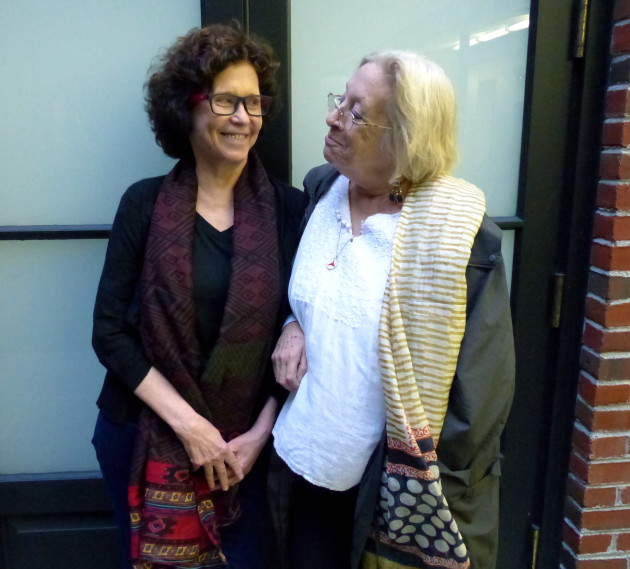
by Amy Stone
A Daughter’s Take on Her Red Father

Filmmaker Tova Beck-Friedman (left) and Janet Naava Ades. Photo by Amy Stone.
“Red Father” documents the life of Bernard Ades, American Communist, with the major voice that of his daughter Janet Ades.
The son of a Russian immigrant who was the first Jew to own a bank in Baltimore, Bernard Ades was galvanized by the Depression to become a Communist. With a law degree from the University of Maryland, he joined the Communist Party’s International Labor Defense anti-lynching campaign, defending African Americans in the South. He fought in the Spanish Civil War as a member of an elite Communist cadre. Right up to his death in 1986, he remained an unflinching party loyalist, never faulting Stalin.
The 55-minute documentary by Tova Beck-Friedman is the Israeli-born sculptor’s first major film, and it’s been getting a good run at special event screenings. [See link below for future screenings.]
The many interviews with Janet Ades are buttressed with redacted FBI documents obtained through the Freedom of Information Act. Beck-Friedman brings together music and archival footage—the haunting “Strange Fruit” hanging from the poplar trees over images of lynched black men; Spanish songs, the din of warfare over Spanish Civil War footage. Just one quibble, and correct me if I’m wrong: the footage of black men laboring in the fields looks more like the deep South than the 1930s truck farms of Maryland’s Eastern Shore.
The story deserves to be told, especially from the vantage point of Bernard Ades’s older daughter, now in her 70s. Mother remains a shadowy figure for the daughter who adored her father.
In the 1930s, Ades risked lynching to defend a Negro handyman on Maryland’s deeply racist Eastern Shore. Euel “Orphan Jones” Lee was accused of killing a white family of four headed by a truck farmer who had fired him. Attacked as a “busybody Communist Jewish lawyer,” Ades managed to get the trial moved to Baltimore and to achieve the precedent that African Americans be impaneled as jurors. He won a victory for integrated juries, but Lee was found guilty and hanged. Afterward, Ades had to fight attempts to disbar him.
He ran for governor of Maryland on the Communist Party ticket in 1934. Three years later, he went to fight in the Spanish Civil War with the Abraham Lincoln Brigade, which, his daughter explains, was a Communist front. He ended up an officer in the Spanish Republican Army. Even as his comrades lay dying, Ades maintained ideological correctness, writing of the war’s place in history, the glory and the call to arms. (Did he ever depart from the party line, even in the bosom of his family?)
Ades’s return from Spain was the start of J. Edgar Hoover’s decades-long investigation of him. Janet Ades recalls how her father laughed off being trailed by FBI agents, with little sympathy for the fears of his wife and two daughters. When he was fired from the Federal Housing Authority, the family moved to the Sholem Aleichem Cooperative Houses in the Bronx. With mostly socialist and Communist neighbors, Janet Ades describes life there as “safe, secure and 99 percent Jewish.”
Her descriptions of the family perspective on World War II have an air of surrealism. They pinpointed Soviet victories on a map, collected clothes for the Russians, and never mentioned the Holocaust or their family members exterminated in Poland.
By the 1950s, with McCarthyism and the House Committee on Un-American Activities hearings in full swing, Walter Winchell’s millions of radio listeners heard him denounce Bernard Ades as a dirty Communist. Ades maintained his Soviet liaison work but his career as a public accountant was destroyed. He scraped by financially for the rest of his life.
Devoted to her charismatic father, Janet Ades belonged to the Labor Youth League. She fell from grace when her boyfriend, attending a 1956 Communist World Youth Festival in Hungary, questioned why so many troops were in the streets. When she stuck with her now politically unacceptable boyfriend, her father was merciless in his retribution, sending her off to be reeducated. She was reduced to wondering if her own father loved her.
From this point on in “Red Father,” she emerges as the “tough broad,” describing her political education group as spouting “Soviet nonsense” with the “cockamamie theory” that American democracy was not a democracy. She criticizes her father as a highly intelligent man who never admitted the failings of Communism.
As she says at the film’s conclusion: “I loved my father and I admired him enormously. He had courage. He was brave. And he was savvy, but his loyalty to the party was not consonant with his savviness [sic].”
At least this viewer would have liked to have heard more from the daughter of Red Father on how her own life was shaped by this true believer—in what ways she followed his path, whether she felt his party loyalty in America’s hysterically anti-Communist Cold War era fractured her own life, and if she identifies with other ideologies, including Judaism.
It would be a challenge for any first-time documentary filmmaker to interweave the complexities of one man’s life story primarily told by his daughter with the intricacies of her own life.
In the course of the film, Janet Ades certainly goes through superficial changes–changing hair color, changing the way she dresses. For unknown reasons, she refers to her father as “Bernard.” Is this part of distancing herself from him? And we’re not told that “Janet” is now “Naava,” a name change that came with living in Israel. In short, I wanted more of the full spectrum of growing up the daughter of Red Father.
For “Red Father” screenings and DVD purchase information, go to http://tbfstudio.com/red_father.html